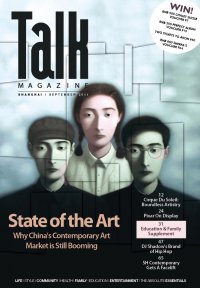RAM Returns with Zhang Huan

After making a splash on Shanghai's art scene when they opened in 2010, the brand new Rockbund Art Museum (affectionately known as RAM) did something rather unconventional – they closed for six months of renovations. But this month they are open for business once more with a solo exhibition from Zhang Huan, one of China's premier avant-garde artists.
From the beginning of Zhang Huan's career, as one of the first wave of Chinese performance artists active on the Beijing scene in the 1990s, he never failed to make an impact. Though he has not been a favourite of authorities, being reprimanded more than once for the perceived “inappropriateness” of his artistic performances, Zhang won the attention of art fans around the world with his visceral and masochistic performances.
Using his body as a medium, Zhang has chained his naked self from the ceiling of his apartment and slowly dripped his own blood into a metal bowl in a piece called '65 Kilograms'. He also, famously, slathered his body in honey and fish oil before sitting nude in a fly-infested, stench-filled public toilet in '12 Square Meters'.
 “No one can escape cruelty, neither myself, nor the audience,” Zhang Huan said early in his career. “Once the audience members step into the site of the performance, they become involved in the reality before their eyes. They have nowhere to escape, just as they have no way to escape reality.”
“No one can escape cruelty, neither myself, nor the audience,” Zhang Huan said early in his career. “Once the audience members step into the site of the performance, they become involved in the reality before their eyes. They have nowhere to escape, just as they have no way to escape reality.”
After moving to New York in 1998, Zhang Huan's performances increased in complexity, and were often composed of several parts. According to the artist, this progression was a necessary response to his increasingly complicated relationship with the world as a Chinese artist living, working and travelling in the West.
“In China, I was doing things for myself. Now people invite me to perform, to become a cultural event. I have a job to do,” Zhang said. “I try to understand each new situation. I combine impressions of China with local culture, what people call glocal. It's about going from one place to another, and bringing what you have to offer to each new place. Sometimes I understand the experience, sometimes not.”
In later years, Zhang has moved back to China and now bases himself in Shanghai, where he has reinvented himself as a painter, sculptor and installation artist. Spirituality, particularly in the Buddhist context, has become a prevalent theme in his work.
According to RAM's deputy director, Liu Yingjiu, the museum has been interested in featuring an exhibition of Zhang's new works since before the museum was inaugurated in 2010. The parties went back and forth with proposals, and the artist developed ideas for two years before they came up with the 'Q Confucius' incarnation, which will be Zhang's largest solo show in China to date and won't be featuring either foul smells or the artist's blood.
With Confucius as his inspiration, Zhang examines the impact of China's rapid development on the country's art, society and religion. Featuring all new works commissioned specifically for this exhibition, a variety of mediums – including animated large-scale sculptures, paintings, ash paintings and live animal installations – will be on show.
“The idiosyncratic elements of these materials will bring striking visual and intellectual tension to the audience, and in the meantime, its emotional power will be communicating with the spiritual subject of the exhibit, which will be alluring and thought-provoking,” Liu says.
One of the major themes Zhang uses Confucius to explore is whether there is (or should be) a sense of spiritual belonging in contemporary China. By contrasting the traditional Chinese spirituality with the teachings of deities from around the world, he asks whether China should return to its roots, look west for spiritual inspiration, or turn in a completely new direction.
'Zhang Huan: Q Confucius'. 15 October – 29 January 2012. Rockbund Art Museum, 20 Huqiu Lu, near Beijing Dong Lu. Tel: 3310 9985. Web: www.rockbundartmuseum.org


